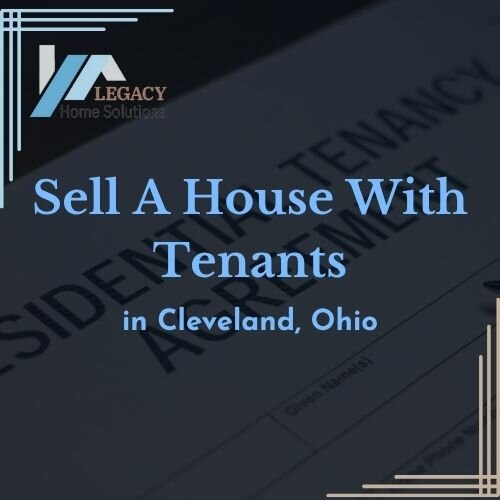
Real Estate Market Trends in Cleveland, OH: What Sellers Need to Know
Cleveland, OH landlords who wish to sell rented property must understand the real estate market. Due to Cleveland real estate market changes, more individuals rent homes and apartments. Because housing is cheaper and out-of-state investors want it. Sellers should consider local market prices and selling time. Ohio City, Tremont, and University Circle are attracting purchasers as young professionals move to the city for work and neighborhoods are redeveloped.
Competitive offers may boost home values for sellers. Even though spring and summer are more active than fall and winter, consider the seasons. Knowing these trends helps landlords arrange sales for peak demand. Mortgage rates affect buyers’ affordability and the market, thus they should be monitored. Cleveland’s real estate trends might help sellers market rented houses.
Understanding Tenant Rights When Selling a Rental Property in Cleveland, OH
If Cleveland, OH landlords wish to sell a rental home in Hudson, OH, they must recognize tenants’ rights under Ohio law. Renters can’t be evicted because the property is sold. Unless both parties agree, Cleveland tenants can stay in their houses until their lease expires. Before showings or inspections, landlords must give 24 hours’ notice.
Tenants should understand the sale process and its impact on their housing. Landlords should also know that new owners must follow contracts and assume tenant responsibilities. Knowing these legal requirements preserves tenant rights, streamlines operations, and prevents issues.
Legal Considerations for Selling a House with Occupants in Ohio
To comply with state and municipal rules, Cleveland landlords selling rental houses must address many legal issues. Read the lease to learn about tenant rights and sale/termination restrictions. Ohio landlords must provide potential buyers 24 hours’ notice before viewing the property, unless the lease states otherwise. Selling a rental home doesn’t immediately end the lease. New owners must preserve old agreements until they expire unless both sides agree.
Landlords must follow state and federal fair housing rules during sales. This implies they can’t discriminate by race, color, national origin, religion, sex, family status, or disability. When properties change hands, landlords must manage security deposits properly. Ohio landlord-tenant law-savvy real estate lawyers can help you sell a rented Cleveland house
The Pros and Cons of Selling a Rented Home

Selling a rental Cleveland, OH house has perks and cons. These are items landlords should consider. Real estate investors can generate cash flow right immediately without finding new renters when they buy rental properties with existing tenants. This may attract fast-growing investors to your home. Leases that limit showings or compel landlords to obey tenant rights laws may make selling a rental house difficult.
Ohio landlords must respect state landlord-tenant laws while maintaining excellent relations with tenants. Due to the Cleveland market, buyers may worry about bad renters or lease terms they didn’t agree to. Landlords selling rental homes must consider these factors.
Timing Your Sale: When Is the Best Time to Sell a Rented House?
You must understand the Cleveland, OH real estate market and lease agreements to sell a rented residence. Timing matters. Cleveland rental homes sell best in spring and early summer, when buyers are most interested. Consider lease terms. If you sell toward the end of a lease, purchasers may want to move in immediately without tenant issues. Working with renters to schedule showings helps simplify the Landlords can increase rent and appeal by monitoring the market and adjusting it to tenant contracts.
Preparing a Rental Property for Sale: Tips and Best Practices
You must do a few things to make a Cleveland, OH rental property more desirable and valued for selling. Check the property for problems and fix them. This includes addressing leaking faucets, building construction issues, and HVAC efficiency. Consider painting and landscaping the exterior for a good first impression. Encourage tenants to clean up during showings to maintain communal areas tidy. Discuss the sales process with your renters and arrange viewings for possible purchasers.
Lower rent can encourage tenants to maintain the property during this time. Leases, maintenance records, and financial performance figures help purchasers understand how much they could make renting your home. Cleveland landlords selling rental houses should follow these guidelines.
Navigating Lease Agreements When Selling Investment Properties
Cleveland landlords must know lease terms before selling rental properties. You must understand the lease terms to complete the transaction. Owners must check leases for property transaction and tenant rights language. Ohio tenants can stay in their homes until their lease ends unless otherwise agreed. Let renters know you want to sell to avoid conflicts and streamline showings and inspections. Landlords must also know local landlord-tenant laws, such as giving notice before entering or ending a lease. Giving buyers precise information on renters and lease terms may boost their confidence and speed up the transaction. If leases and tenant relations are handled effectively, Cleveland landowners can sell investment properties legally.
Strategies for Negotiating with Tenants During a Home Sale

To sell a rented Cleveland, Ohio residence, you must negotiate with tenants. Discuss your property sale with your tenants and how it may affect them. Understanding and solving their issues builds trust. Offer lower rent or moving costs to encourage collaboration during showings or open houses.
Read the lease for tenant rights and observe local laws. When considering house sales modifications, Cleveland landlords must consider tenant protections. Respecting tenants’ privacy and being transparent helps prevent issues. Making property viewings convenient for tenants can also encourage them to work with buyers. You can like selling Cleveland rental houses if you appreciate communication and flexibility.
Communicating Effectively with Tenants Throughout the Sales Process
Selling a Cleveland, OH house requires good tenant relations. Landlords who inform tenants about the sale early build confidence and openness. Explain how the arrangement would affect them and remind them of their Ohio tenant rights. Regular showing or inspection updates can assist keep things operating smoothly and demonstrate respect for their home.
Show at times that fit their schedules to encourage collaboration. Clarify how the lease terms will be met or passed on to future owners to eliminate concerns about eviction or lease breach. Open communication makes tenants happier and gives potential buyers a well-kept, inhabited home.
How to Market a Tenant-occupied Property Effectively
Planning and communicating are needed to market Cleveland rental property. Discuss the property’s location, amenities, and recent updates. Use high-quality photos and virtual tours to show renters the home without bothering them. Reward tenants for cleaning and being flexible with showings to get them to cooperate.
Use social media, websites, and tenant-focused Cleveland real estate brokers. Marketing messaging should appeal to investors who want to rent the property and buyers who want to buy it. In this competitive market, outlining the benefits of owning a tenant-occupied house, such as immediate rental revenue and easier tenant management, can attract more purchasers.
Attracting Potential Buyers to Tenant-occupied Listings
Tenant-occupied Cleveland, OH homes need careful preparation and advertising to sell. Landlords must prove their property makes money. Discuss the advantages of buying a house with tenants, such as earning rent straight away and reducing the risk of it being empty. Show investors clean financial records with regular cash flow and dependable renters to attract them.
High-quality photos and virtual tours can showcase the property without annoying tenants. Talk about the property’s proximity to schools, parks, and public transportation to attract attention. Telling renters about showings beforehand keeps them cooperative during the sales process while maintaining their privacy. Legacy Home Solutions, LLC Buys houses in any condition in Cleveland and Other Cities in Ohio. Learn about Our Process and get answers to any Questions you may have.
Conducting Showings and Open Houses with Tenants Still Residing
When displaying or hosting an open house for a Cleveland, OH tenant-occupied residence, be careful and friendly to the renters. Ohio law requires 24 hours’ notice before showings for tenants. Schedule showings at renter-friendly times to reduce interruptions. Rental discounts or gift vouchers can motivate renters to collaborate.
Sell a house honestly and don’t disrupt the tenant’s privacy or living space. If tenants dislike visitors, host virtual tours or open houses. Stay in touch with tenants to resolve sale or lease issues. Better showings and a solid relationship with tenants come from trust and understanding.
Understanding Fair Housing Laws Relating to Selling Rental Homes
Cleveland landlords must grasp fair housing requirements before selling a rented home. These principles eliminate discrimination and give all renters the same chance, regardless of race, color, religion, sex, national origin, family status, or disability. Rod Cleveland landlords selling rental apartments must follow Ohio and federal fair housing laws. This entails informing renters of the sale while maintaining their privacy and showing the property when convenient.
Discriminatory remarks or actions by landlords during sales or negotiations are also prohibited. Understanding and following fair housing standards allows landlords to sell their rental home without issues. This will help them keep peace with renters and follow the law.
Incorporating Rent Rolls and Lease Terms Into Your Sales Strategy

Rent rolls and lease terms may help you sell a rented Cleveland residence. Rent rolls reflect a property’s whole rental income. Maintaining correct rent rolls shows landlords have a regular income flow. Investors seeking rapid returns are drawn here. Potential buyers can grasp the lease’s duration, renewal, and rent increases by knowing the lease conditions.
Tenant agreement transparency boosts customer confidence and helps them plan their finances. If tenants have always paid rent on time and kept in touch with the landlord, the property may be worth more. Detailed rent rolls and lease conditions will assist your rental property make money in Cleveland’s investment property market.
Analyzing the Financial Impact of Tenant Occupancy on Property Value
Sellers of Cleveland, OH rental properties must consider how tenant occupancy influences value. Rental homes may be worth more, but they have issues. Investors who wish to rent the property right now may choose a long-term tenant. Lease restrictions or tenants attending showings may deter some bids.
Property owners in Cleveland’s competitive real estate market must consider how tenant occupancy influences sales and negotiations. A property’s value depends on the lease length, rent history, and market rate. Understanding these elements helps landlords meet customer expectations and increase sales.
Tax Implications of Selling Rental Property with Existing Tenants
When selling a rented property in Cleveland, Ohio, landlords must consider the tax implications. Selling a rental property generates capital gains taxes on the difference between the sale price and adjusted basis. Landlords should consider recapture because property depreciation deductions may be taxed when sold. Landlords must understand how these factors effect their taxes.
Landowners must also follow state and municipal tax laws for rental properties. Talk to a tax professional who knows Ohio’s real estate market to lower your taxes and obey the rules when selling a rental property with tenants.
How to Handle Security Deposits When Transferring Ownership
To sell a rental Cleveland, Ohio home without issues, handle the security deposit properly. Landlords must first review the lease and Ohio security deposit rules. The new owner should know about deposits and their amounts and transactions. Inform the buyer that they will pay these sums at closing.
The purchase agreement may also cover security deposit transfers to safeguard both parties. After the sale, tenants should know who has their deposit and their Ohio law rights. By taking care of these things, landlords may ensure a smooth transfer and build trust between new owners and tenants while upholding Cleveland’s rules.
Crafting an Eviction Plan: Guidelines for Landlords Looking to Sell
Cleveland, OH landlords selling rental houses must have an eviction strategy. To avoid conflict and respect the rules, know your local landlord-tenant legislation. First, landlords should check their agreements for notice or early termination requirements. Informing renters of the sale and scheduling their departure is crucial.
Legally giving tenants plenty of notice helps maintain good connections and facilitates property showings. Lower rent or moving fees may speed up tenant turnover. A real estate lawyer or property manager can assist you create an Ohio state and Cleveland municipal-compliant eviction strategy. Landlords can sell occupied homes by planning and talking to tenants.
Utilizing Cash-for-keys Agreements in Real Estate Sales Transactions
Cleveland, OH landlords can use cash-for-keys to evict renters. This speeds up house sales and makes it more appealing to buyers. Cash-for-keys deals help reduce conflicts and evictions in Cleveland’s competitive housing market, where tenant rights are robust. These agreements should provide salary and move-out dates to protect both parties.
Negotiating these terms will make the property more appealing to purchasers, speed up the sale, and preserve the tenant relationship.
Can a Landlord Sell a House During a Lease in Ohio?
Yes, a landlord can sell a house during a lease in Ohio, including Cleveland. It’s essential to understand the legal framework governing such transactions to successfully navigate the process. Under Ohio law, selling a tenant-occupied property does not automatically terminate the existing lease agreement. The new owner must honor the terms of the lease until it expires.
Landlords should communicate transparently with tenants about their intentions to sell and provide adequate notice for property showings, respecting tenant privacy rights under Ohio’s landlord-tenant laws. Additionally, landlords should include provisions in the sales contract addressing tenant occupancy to ensure a smooth transition for both parties. By adhering to these guidelines and maintaining open communication, landlords can effectively manage the sale of their tenant-occupied property in Cleveland while complying with Ohio regulations.
Can I Sell My House While I Have a Tenant?
Selling a tenant-occupied house in Cleveland, OH, is entirely possible and can be a straightforward process if managed correctly. As a landlord, you have the legal right to sell your property in Brooklyn, OH even while it is occupied by tenants. However, it’s crucial to understand the tenant’s rights under Ohio law and any lease agreements in place. Before listing the property, review the terms of your lease to determine if there are any restrictions or required notices for showing the home to potential buyers.
Communicating openly with your tenants about your intentions can help ease their concerns and ensure their cooperation during showings and inspections. In some cases, offering incentives such as rent reductions or flexible moving arrangements might encourage tenants to support the selling process. Working with a real estate professional experienced in handling tenant-occupied properties in Cleveland can also streamline the transaction by navigating local regulations and market conditions effectively. Whether you’re dealing with long-term renters or tenants on month-to-month leases, understanding these dynamics is key to successfully selling a tenant-occupied house in Cleveland.
How Much Notice Does a Landlord Have to Give When Selling the Property in Ohio?
When selling a rental home in Cleveland, Ohio, it’s important to know the rules about giving notice to the landlord. Landlords in Ohio must obey both state and municipal rules when they tell renters about property transactions. Landlords should let tenants know in writing if they wish to sell. Landlords in Ohio don’t have to penne to tell renters about the sale, but they do have to follow the rules for exhibiting and inspecting the property.
Most of the time, these businesses need 24 hours’ notice before they can enter the premises. Cleveland landlords need to read agreements and talk to lawyers to be sure they are following state and municipal rules. This proactive approach keeps tenants in the loop and makes the transaction run more smoothly. Landlords in Cleveland can sell rental property as long as they give renters enough notice and protect their rights.
Is It Harder to Sell a Property with Tenants?
There are both challenges and chances when it comes to selling rental property in Cleveland, OH. Knowing the details can help you sell a house with tenants. Showing and inspecting the property around tenants’ schedules can make it harder for buyers to see it. Tenants could not care how the house looks, which could change how purchasers feel about it.
In Cleveland’s rising real estate market, investors might make money right away by selling a home with renters. Landlords must tell renters when they plan to sell and provide them reasons to work with them. To avoid legal problems that could make selling difficult, you need to know the requirements for tenants in Ohio. Cleveland landlords can sell rented properties if they correct these problems.
Helpful Cleveland Blog Articles
- Selling A Hoarder House Quickly in Cleveland
- Selling Your Mortgaged House In Cleveland, OH
- Appraisal Required Repairs For Cleveland Home
- Selling A Mold-affected House In Cleveland, OH
- HOA really take your house in Cleveland, Ohio
- Paperwork For Selling Your Cleveland Home
- Home Sale Contingencies In Cleveland’s Real Estate Market
- Selling a House with Tenants in Cleveland, OH
- Taxes to pay when Selling house in Cleveland, OH
- Successfully Sell Your Home By Owner In Cleveland, OH
- Selling A House With Asbestos In Cleveland, OH
- Is There a Way to Avoid Capital Gains Tax in Cleveland, OH
- Refinance a House After Divorce in Cleveland, OH

| RENTING | CLEVELAND OHIO | TENANTS’ RIGHTS | EVICTION NOTICES | ATTORNEYS | BROKER |
| RENT CONTROL | HOMEBUYERS | CLEANLINESS | MONEY | LEGAL BATTLE | |
| LITIGATION | LAWSUITS | RIGHT TO PRIVACY | LEGAL ADVICE | FEES | BLOG |
| AUCTIONS | ROFR | RIGHT OF FIRST REFUSAL | RENTAL AGREEMENT | REAL ESTATE TRANSACTION | LEGAL RIGHTS |
| REPAIRS AND MAINTENANCE | INSURANCE | INCOME TAX | HEADACHES | FORECLOSURE | FAILURE |
| COURT | ASSET | HOUSE WITH TENANTS | SELLING A TENANTOCCUPIED | THE PROPERTY IS | THAT THE PROPERTY |
| A TENANTOCCUPIED PROPERTY | WITH TENANTS IN | IF THE TENANT | TENANTS IN PLACE | FAST FOR CASH | OHIO REAL ESTATE |
| A PROPERTY IN | REAL ESTATE INVESTMENT | RESOURCES PRIVACY POLICY | SELL A TENANTOCCUPIED PROPERTY | PROPERTY WITH TENANTS IN | A HOUSE WITH TENANTS |
| RENTAL PROPERTY WITH TENANTS | END OF THE LEASE | WITH TENANTS IN PLACE | THAT THE PROPERTY IS | HOUSE FAST FOR CASH | SELLING RENTAL PROPERTY IN |
| PROPERTY ADDRESS STREET ADDRESS | HOME SELLING A PROPERTY | MARIANA ISLANDSOHIOOKLAHOMAOREGONPENNSYLVANIAPUERTO RICORHODE ISLANDSOUTH | ON OPTIONS TO SELL | A PROPERTY IN TODAYS | CAROLINANORTH DAKOTANORTHERN MARIANA ISLANDSOHIOOKLAHOMAOREGONPENNSYLVANIAPUERTO |
| TODAYS MARKET CAN BE | OPTIONS TO SELL YOUR | MORE INFO ON OPTIONS | INFO ON OPTIONS TO | SELLING A PROPERTY IN | YOU THROUGH YOUR OPTIONS |
| IN TODAYS MARKET CAN | PROPERTY IN TODAYS MARKET | DAKOTANORTHERN MARIANA ISLANDSOHIOOKLAHOMAOREGONPENNSYLVANIAPUERTO RICORHODE | ISLANDSOHIOOKLAHOMAOREGONPENNSYLVANIAPUERTO RICORHODE ISLANDSOUTH CAROLINASOUTH | MARKET CAN BE CONFUSING | GET YOUR FAIR CASH |
| WHEN SELLING A PROPERTY | YOUR FAIR CASH OFFER | HOUSE WITH TENANTS IN | GET A CASH OFFER | RESOURCES PRIVACY POLICY BLOG |

